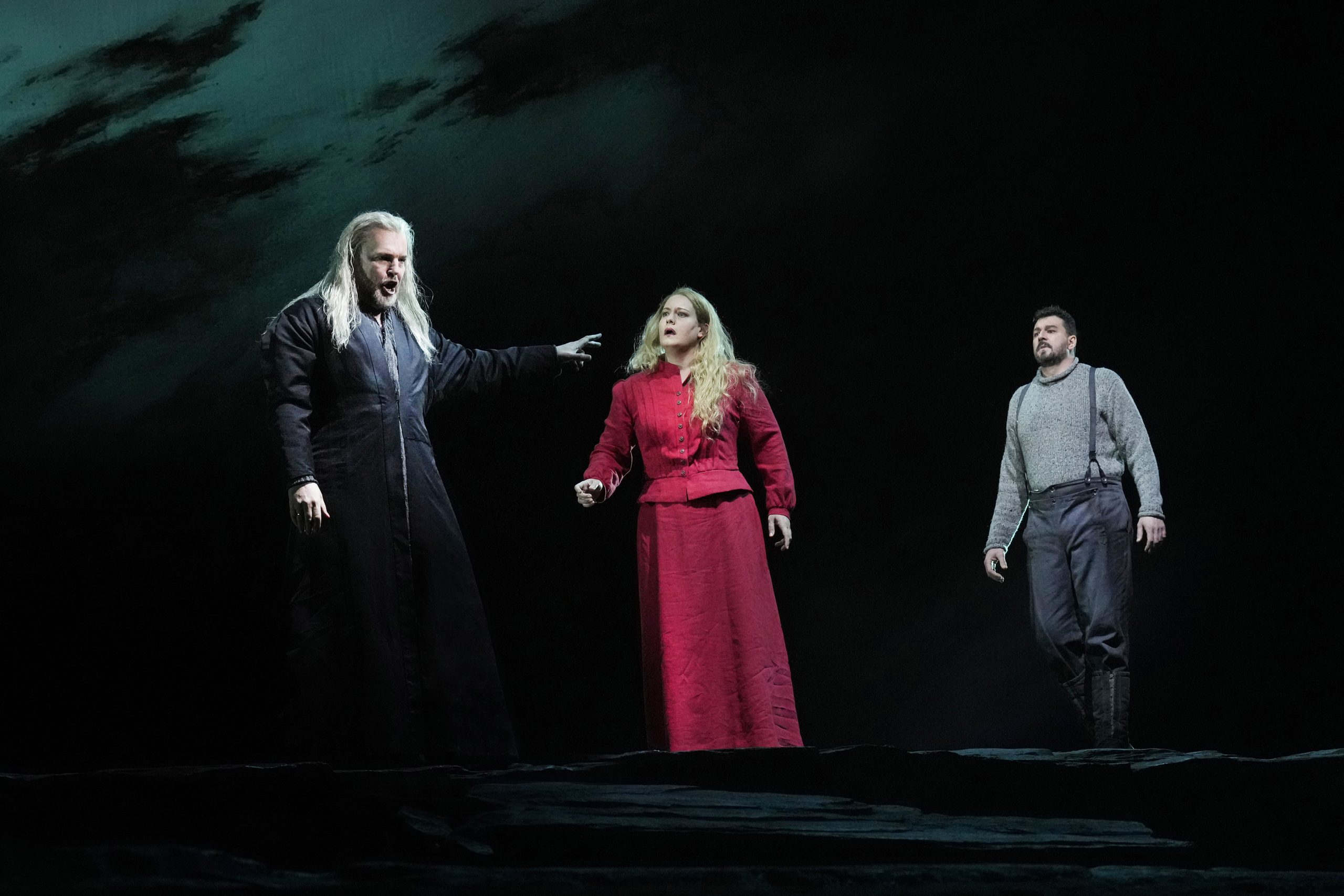The Met’s last new staging before 2020’s pandemic shutdown–François Girard’s Der fliegende Holländer–disappointingly staged and cast and poorly conducted by Valery Gergiev–returned to port more enjoyably for four end-of-season shows. Girard ameliorated some staging aspects. In Wagner’s brilliant Overture–the best orchestral playing the debuting Thomas Guggeis achieved all night—Senta’s double no longer executed wildly ludicrous choreography all over the stage. Senta was still there, but it was Elza van den Heever; her gestures and stances were far more restrained and the lighting effects previously evoking a Reagan-era planetarium light show had also been improved. But this remains a problematic staging, with poor allocation of space and one fundamental lack: the Holländer has no ship, despite the music heralding its arrival. Therefore, bass-baritone Tomasz Konieczny (a remarkably strong-voiced, theater-filling antihero, though lacking the legato that José van Dam, Robert Hale, and James Morris evidenced) must enter walking across the waves, sing “Die Frist is Um”–which won an ovation for its intensity–dwarfed by Daland’s ship, and then, after concluding his bargain with Daland, march back across the waves in full view of Daland’s crew. Later, the ship, which the chorus (in admirable form) addresses, now appears only as spotlights on clouds–as at a supermarket opening.
After recently viewing Girard’s more successful but static Lohengrin, one must conclude that he has little gift for choral blocking. The choristers executed feebly conceived uniform movements and stances–only the “spinning” women and their cat’s cradles of huge ropes make a striking impression, and then a distracting one–they trundle off to the wings in slow files, recalling bus-and-truck provincial performances. When the Steuermann loudly yawned–three times!–and when the Holländer rose up through the floor to confound Senta, many spectators simply laughed out loud, particularly unfortunate in that charged moment.
Van den Heever enacted a convincingly girlish, impulsive Senta; her voice, most colorful at its top, dispatched the difficult high notes and triplets with aplomb (a real feat in the Ballad, essayed up a tone in A minor at her request). Yet the passion she showed visually only rarely colored the timbre one heard. Her voice blended better with Konieczny’s cutting timbre than did that of Dmitry Belosselskiy (Daland). The Ukrainian bass fielded a fine, capacious instrument that all but vanished on the bottom notes. The characterization of the rapacious captain was quite inert, as if neither he nor the director or conductor had grasped from Wagner’s music and text that Daland is a comic character descended from Fidelio‘s Rocco and–like several numbers in the score–the world of Lortzing.
There’s a tradition of Holländer tenors moving from the lyrical Steuermann to the heavier Erik, whose challenging music (especially in the cavatina-like set pieces) derives not only from Weber but from Bellini. In 1970, George Shirley, led by Karl Böhm, effected the shift in roles within a single run. Jean-Pierre Ponnelle’s 1979 Holländer production played with this duality, making the two characters one and the whole plot “the Steuermann’s dream.” After René Kollo defected in rehearsals, William Lewis and then Robert Nagy performed both roles. (This–by current Regietheater standards–mild directorial gambit provoked the first savage booing this then-teenaged operagoer had ever witnessed.) When Girard’s production premiered in 2020, the only satisfying elements were the two tenors: Sergey Skorokhodov, fearless in Erik’s high tessitura, and the relaxed, charming-sounding David Portillo in the Steurmann’s folkish songs. This year, the finest overall singing again came from the Erik: Iowan tenor Eric Cutler, who in the decade since last at the Met has built up his light instrument into a reportedly excellent Lohengrin and Ariadne Bacchus. He sang Erik with rare command and security and acted with commitment, though in the opera’s final trio, Girard’s direction all but abandoned his singers, leaving Erik to pace back and forth disconcertedly. This year’s Steuermann, Richard Trey Smagur, will sing Erik at Santa Fe this summer, alongside van den Heever under Guggeis. Smagur’s good, bright voice is in trouble, with every phrase involving the passaggio awkwardly negotiated. Though a mezzo rather than the preferable contralto, the stage-savvy Eve Gigliotti made all of Mary’s music uncommonly precise and audible.
Guggeis–all of 29–won some critical raves and equally dismissive reception on online forums. It’s sad that the industry so craves redeemers in the form of puff piece-worthy, photogenic Wunderkinden. He struck me as a capable enough conductor, managing an idiomatic but not always judiciously paced reading despite the lack of rehearsal evident in the sometimes ragged instrumental details, most seriously the slurred oboe in the lead-in to Erik’s “Mein Herz, voll Treue bis zum Sterben.” Guggeis may develop into an asset like several other more seasoned new conductors this season: Michele Gamba, Manfred Honeck, Nathalie Stutzmann, and Keri-Lynn Wilson.
© Wagner Notes, July 2023, a publication of the Wagner Society of New York. All rights reserved.
